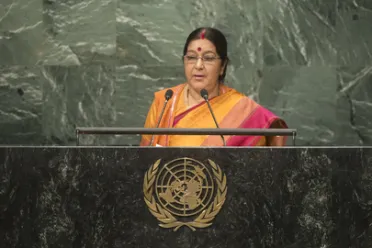Statement
Statement summary
SUSHMA SWARAJ, Minister for External Affairs of India, noted that much had changed in the world over the past year, and the international community must remember that it would be defined not just by its actions, but equally by its inaction. “The true challenge of our time is to end the curse of harsh poverty that still lurks in so many corners of our world,” she said. It was critical to ensure that the fruits of growing prosperity reached those who needed them most, in order to take forward the mission of gender equality and to ensure peace across borders. Noting that one sixth of humanity lived in India, she said the success of the 2030 Agenda for Sustainable Development therefore depended on the success achieved in her country. To confront the challenges posed by climate change, the Prime Minister had championed the concept of “climate justice”, which recognized the principles of common but differentiated responsibility and respective capabilities. Developed nations must discharge their responsibility in ensuring the common good by providing financing and technology transfer, she said, adding that India would continue to play a leading role in combating climate change.
Recalling that the recent fifteenth anniversary of the 11 September 2001 terror attacks on the United States, she said that, despite the blood and tears of innocent victims, attacks had continued in Kabul, Dhaka, Istanbul, Mogadishu, Brussels, Bangkok, Paris, Pathankot and Uri in 2016 alone. Barbaric tragedies also continued daily in Syria and Iraq. Describing terrorism as the largest violation of human rights and a crime against humanity, she said “history proves that those who seed extremist ideologies reap a bitter harvest”. Humankind must unite across its differences, add steel to its resolve and inject urgency into its response, she emphasized. Any nation that refused to join that global strategy must be isolated. “In our midst, there are nations that still speak the language of terrorism,” she said, warning that countries must be held to account for sheltering terrorists. She recalled that on 21 September, the Prime Minister of Pakistan had levelled baseless allegations of human rights violations against her country and that India had put in place unacceptable preconditions for dialogue. Both accusations were untrue, she said, stressing that Jammu and Kashmir was an integral part of India and would always remain so.
Full statement
Read the full statement, in PDF format.
Photo

Previous sessions
Access the statements from previous sessions.
